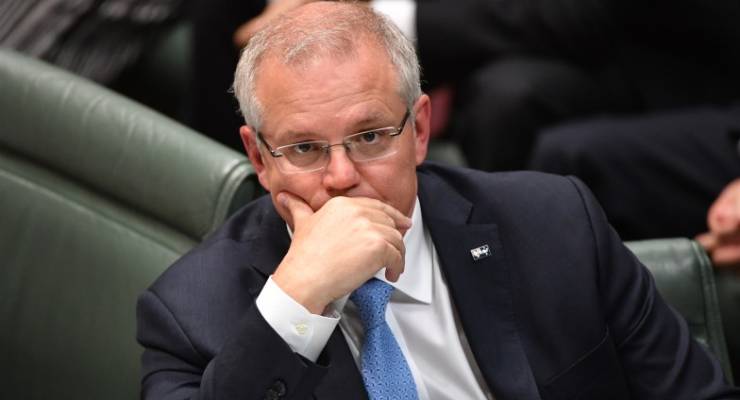
“1080” is a notoriously noxious poison for rabbit bait that has now been abandoned because of the collateral damage it caused to other wildlife. After yesterday’s retail sales figures for September, it’s clear a different kind of poison by the same name has claimed some new victims: what’s left of the Morrison government’s economic credibility, and the Reserve Bank’s reading of the economy.
The $1080 tax refund, coupled with the Reserve Bank’s interest rate cuts, was going to save a stagnant economy. It was a “political masterstroke” lauded by the press gallery — remember all those column inches obsessively devoted to dissecting how Labor was wedged on it? — and an economic marvel that was compared by some to the Rudd government’s GFC-era stimulus.
It turned out, impressively, to be the first tax cut in history that actually led to a fall in consumer activity. Retail sales volumes — that’s the amount of goods actually sold, regardless of price changes — fell 0.2% in the three months to September, against a rise of 0.1% in the June quarter (itself revised down from the ABS’ 0.2% original estimate). After the first nine months of the year, retail sales volumes are still lower than at the start of the year, and three of the last four quarters have seen negative volume growth.
Retail turnover — the dollar value of sales — rose a seasonally adjusted 0.2% in the month of September, but that was half the 0.4% rise in August. And don’t forget that was after not one but two interest rates cuts in June and July, before the third at the start of October. Net result: zilch for the economy.
For the media outlets that predicted a “GFC stimulus-like bounce” from Morrison’s refund, how does that compare to Kevin Rudd and Wayne Swan’s cash-splashes in late 2008 and 2009? Retail volumes grew 1.3%, 1% and 1.8% between the December 2008 quarter and the June 2009 quarter. Say what you like about Rudd, at least he could get people to spend when we needed it.
What went wrong? Nine’s Shane Wright has noted that that the average size of the tax refunds was $400, not the $1080 figure bandied about by Morrison and, when he can actually be found, Treasurer Josh Frydenberg.
But the bigger problem is that Australian households know that the tax refund was a small fraction of the wages they have missed out on after years of deliberate wage stagnation under the Coalition — years that have made them reluctant to spend, even as residential mortgage costs have fallen with ever-lower interest rates. The increasing chunk of their incomes lost to taxes — as the Reserve Bank has repeatedly pointed out — has also crimped household spending.
Tighter belts and closed wallets have been pummelling the retail and automotive sales sectors since 2018 and Morrison’s refund did — quite literally — nothing to change that.
The September data won’t go down well at the Reserve Bank, which had been including the expected benefit from the refund in its call that the economy had reached “a gentle turning point”. If anything, that turning point now looks like it’s pointing the wrong way.
RBA governor Philip Lowe had been enthusiastic and detailed about just how useful the refund would be. “One factor that should help is an expected pick-up in household disposable income,” he said in a September speech. “Many households are currently receiving larger tax refunds due to the low and middle income tax offset. These payments will boost aggregate household income by 0.6% this year. Past experience suggests that around half of these tax refunds will be spent over coming quarters.”
Maybe it’ll show up in the December quarter, governor?
More likely, the forecasts in Friday’s fourth and final RBA Statement on Monetary Policy for the year will be changed again to reflect the failure of the tax boost, weaker than expected inflation figures from last week and the complete lack of interest from the government in doing anything about it. The Great Morrison Stagnation will continue.









I think I’ve finally realised what Morrison’s political agenda is: to reduce Australia to third-world country status so as to free us from meeting our Paris climate agreement!
It’s the drought, mate. Trickle down has dried up. How’s about some ‘not-welfare-cash’ for those of us doing it tough? Don’t forget, we wage and salary earning townies are the ‘salt of the earth’ too, cause without us our ‘salt of the earth’ country cousins wouldn’t have a market, or someone to pay taxes to fund their ‘not-welfare-cash’ payments.
Where for art thou, Steve Keen?
If this government had really wanted to jump start the economy, then they’d have either (a) increased the tax-free threshold and/or (b) adjusted the threshold at which the first & second tiers of tax kick in. This would have provided the maximum benefits to the bottom 50%-70% of the population……the same part of the population most likely to spend the additional cash in their pockets.
As always, though, their tax cuts had more to do with helping out their rich mates than it did with stimulating the economy.
“How good are my tax cuts at economic stimulus?”
……. Fraudberg’s in witless protection?
Be aware that Conmann, frydenberg, and morrison, ALL WANT RECESSION.
They were put there by the filthy rich to carry out the relentless looting of our society at which Abbott and hockey proved such a failure. After all the Great Recession hit us, but it enriched the filthy rich better than the postwar boom did.
As Rhett Butler said in Gone With The Wind, there’s as much money to be made in the collapse of empires as in the building of them.